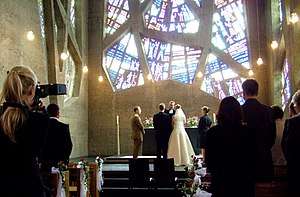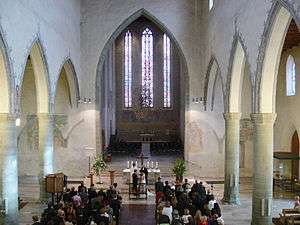Marriage officiant

A marriage officiant, solemniser, or "vow master" is a person who officiates at a wedding ceremony. Some nonreligious couples get married by a government official like a judge, mayor, or justice of the peace.
Religious wedding, such as Christian ones, are officiated by a pastor.[1] Similarly, Jewish weddings are presided over by a rabbi, and in Islamic weddings, an imam is the marriage officiant. In Hindu weddings, a pandit is the marriage officiant. They may also turn to nondenominational ministers who don't follow a specific religious tradition.
Civil
Marriage officiant is a civil officer such as a justice of the peace who performs acts of marriage or civil union. Their main responsibility is to witness the consent of the intended spouses for the wedding license and hence validate the marriage or civil union for legal purposes.
Officiant's duties and responsibilities, as well as who may be an officiant vary among jurisdictions.[2][3][4]
By country
United States
In the United States, Canada and several other countries around the world, a celebrant is a person who performs religious or secular celebrancy services for weddings, funerals, child namings, coming of age ceremonies, and other rituals.
Most Celebrants are ordained clergy (such as a Christian pastor), while some are legal officials (usually judges). In Humanist weddings, a Humanist officiant presides.
Celebrants may perform alternative and nontraditional ceremonies in places, and under circumstances where mainstream religious clergy will not. Some celebrants perform same-sex weddings and commitment ceremonies. Celebrants, also called Officiants, often perform ceremonies in parks, on beaches, on mountains, on boats, on hiking trails, in hotels, in banquet halls, in private homes, and many other places.
Laws in each state of the United States vary about who has the ability to perform wedding ceremonies, but Celebrants or Officiants are usually categorized as "clergy" and have the same rights and responsibilities as ordained clergy. In the United States, celebrants are professional ceremony officiants who believe in the power and effectiveness of ceremony and ritual to serve basic needs of society and the individual. They collaborate with their clients to create and perform personalised ceremonies that reflect the client’s beliefs, philosophy of life, and personality, not the celebrant’s.
Scotland
In Scotland, since a June 2005 ruling by the Registrar General, humanist weddings are now legal, thanks to a campaign by the Humanist Society Scotland. Scotland is the only part of the United Kingdom where Humanist weddings are recognised as legal by the state and is only one of eight countries in the world where Humanist weddings are legally recognised, the others as of 2017 are: Australia, Canada, Iceland, Ireland, New Zealand, Norway and some states of the United States of America.
Celebrants differ from Chaplains in that Celebrants serve the unaffiliated public at large, while Chaplains are usually employed by an institution such as a hospital or other health care facility, the military, etc. However some celebrants of Humanist Society Scotland perform Chaplain duties at Scottish education establishments. [5]
Australia
In Australia, Celebrants have a slightly different role, as regulated by local and national laws.
By faith

Christianity
Catholicism
In the Catholic Church, it is the bride and bridegroom who perform the Sacrament of Matrimony (marriage), but a marriage can only be valid if the Church has a witness at the wedding ceremony whose function is to question the couple to ensure that they have no obstacle to marriage (such as an un-annulled previous marriage or certain undisclosed facts between the couple) and that they are freely choosing to wed each other.
All ordained clergy (i.e. a deacon, priest, or bishop) may witness the wedding ceremony itself, though usually the wedding ceremony occurs during a Mass, which deacons lack the authority or ability to celebrate; however, in weddings that take place inside Mass, the deacon may still serve as the witness to the wedding, provided that a priest or bishop celebrates the Mass; and in weddings that take place outside Mass (which usually occurs in a marriage between a Catholic and a non-Christian or, less often, non-Catholic), the ceremony is the same for deacons, priests, and bishops (with few or no changes).
Quaker
In Quaker weddings the couple marry each other with no third party officiating.
Judaism
In Judaism a Rabbi traditionally officiates over the wedding, however the two people marry each other. They are not married by the Rabbi.
Nonreligious
Nondenominational
Some organizations have limited or no requirements for ordination, like the Universal Life Church. Such organizations may be known as ordination mills, however in most cases, their ordinations provide the same legal standing as mainstream officiants, and marriage licenses signed such organizations are valid and recognized.[6]
Many nonreligious people have their marriages in churches and officiated by Christian pastors.[7]
Humanist
A number of humanist organizations provide credentials to individuals who may solemnize marriages in whatever manner they choose; these are known as humanist officiants.
See also
References
- ↑ Dyck, Cornelius J.; Martin, Dennis D. (1990). The Mennonite Encyclopedia: A Comprehensive Reference Work on the Anabaptist-Mennonite Movement. Mennonite Brethren Publishing House. p. 541. ISBN 9780836131055.
- ↑ Officiant's regulations in Quebec Archived 2007-01-02 at the Wayback Machine.
- ↑ Officiant's FAQ in California Archived 2006-12-01 at the Wayback Machine.
- ↑ FAQ Officiating Weddings throughout the United States, with links to State Code Sections
- ↑ "Humanist Chaplain". Glasgow Caledonian University. Retrieved 26 May 2017.
- ↑ Sipher, Devan. "Great Wedding! But Was It Legal?". Retrieved 2018-10-06.
- ↑ Reju, Deepak (11 April 2012). "Would I Officiate a Wedding for Two Unbelievers? Yes". TGC. Retrieved 11 May 2018.
Even though they may have little connection to a church, many couples today still want a traditional wedding ceremony with a pastor officiating.